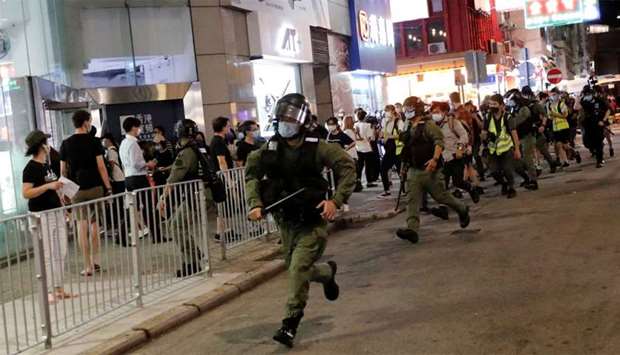Hong Kong riot police used pepper spray to disperse protesters Monday evening on the anniversary of a notorious clash during last year's pro-democracy rallies where officers were filmed beating people on a train.
Dozens of activists gathered outside Prince Edward subway station as night fell to chant pro-democracy slogans and lay flowers, but officers soon declared an illegal protest and riot police with batons and pepper ball guns arrived to break up the crowds.
Throughout the evening they stopped and searched multiple people as pro-democracy slogans were chanted.
Police said they made 12 arrests, including a 17-year-old male "claiming himself to be a reporter" and another person who possessed an imitation firearm.
Nine were arrested for unlawful assembly.
Hong Kong was rocked by seven straight months of huge and often violent protests last year calling for greater democratic freedoms and police accountability.
Street demonstrations have since been snuffed out by zero tolerance policing tactics, anti-coronavirus measures banning public gatherings and a draconian new security law Beijing imposed on the restless city in late June.
Small crowds still often form during key dates from last year's protests.
The 31 August 2019 was one of many days during the unrest when footage of police action deepened public anger towards law enforcement and injected new vigour into the protest movement.
That night police officers stormed into Prince Edward station and were filmed beating multiple people on a subway train with batons, leaving them bloodied.
Reporters and paramedics were later denied access to the station, fuelling online rumours that swirled for weeks of missing people despite no compelling evidence emerging.
An inquiry into the police handling of the protests became a core demand of democracy supporters and rights groups, alongside an amnesty for the more than 9,000 arrested and fully free elections.
Beijing and Hong Kong's leaders have rejected those demands, portraying the protests as a foreign-fuelled plot to destabilise China.

